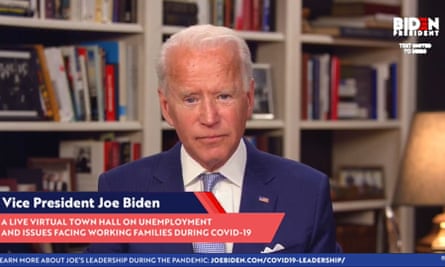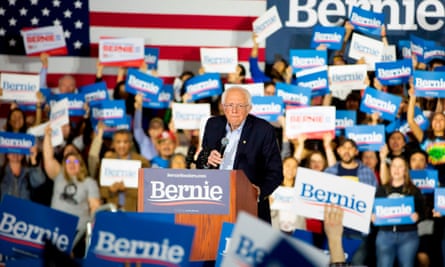Democrats made their choice and on Wednesday Bernie Sanders made it official. His withdrawal from the Democratic primary race leaves Joe Biden with only one opponent: Donald Trump.
Now the stage is set for a November general election battle between two candidates with radically different visions of presidential leadership and America’s role in the world. The contest will unfold in a political landscape transformed beyond all recognition by the coronavirus pandemic that has already claimed at least 14,000 American lives and nearly 10mjobs.
Sanders’ decision to end his campaign came in the middle of what the US surgeon general warned would be the “hardest and the saddest” week the country had faced yet. Reflecting the grim state of affairs, Biden on Wednesday marked the moment with little fanfare.
“This primary is over – but this campaign is just beginning,” he wrote in a fundraising email to supporters, with the subject line “Bernie”. In the appeal, he added that he was “so damn proud” to be the Democratic nominee.
It was result that seemed unlikely just two months ago, when Biden finished fourth and fifth against his Democratic rivals in the Iowa and New Hampshire contests respectively, and came in a distant second behind Sanders in Nevada. But black voters revived his candidacy in South Carolina, in a remarkable turnaround that set in motion his unstoppable march to the nomination.
After accumulating an all-but indomitable lead over Sanders in March, Biden’s grasp of the nomination was hardly in doubt. But the coronavirus forced the race into a state of suspended animation, as more than 15 states delayed their primaries and candidates were forced to cancel traditional campaign events.
Now with primary race firmly behind him, Biden can turn to what is certain to be an extraordinarily divisive and wildly unpredictable general election campaign.

“Thank goodness we can finally get to work,” his wife, Jill Biden, said during a virtual fundraiser on Wednesday afternoon. “We could never presume that before.”
Like most Americans, Biden is homebound for the foreseeable future. From a makeshift TV studio in the basement of his Delaware home, he communicates daily with staff and policy advisers while connecting with voters by internet live streams and TV appearances. But Biden has struggled to find his voice in the midst of this national crisis.
Though Trump, too, has been forced to suspend campaign activities, he delivers daily coronavirus task force briefings that critics argue increasingly resemble in tenor and length his raucous Make America Great Again rallies.
Biden, who has spent most of his life in government, has walked a fine line in criticizing Trump’s handling of the virus. Eager to avoid a “political fight” with the president in a moment of crisis, he is also keenly aware that the pandemic and related economic devastation will likely determine who occupies the White House in a year’s time.
Biden and Trump spoke by phone for the first time this week to discuss the federal response to the outbreak. The idea for the call came from the White House counsellor Kellyanne Conway, who urged him to stop criticizing the president and instead offer his support.
“He had suggestions,” Trump said, describing the call as “wonderful” and “warm”. But he added that it “doesn’t mean I agree with those suggestions”.
Biden mostly echoed Trump’s account, calling the president “gracious”. In an interview on CNN, Biden said he told the president that leadership was about “taking responsibility” and then “laid out what I thought he should be doing”.
Any such goodwill was short-lived. By Wednesday evening, Trump had returned to the playbook he employed against Hillary Clinton to devastating effect. From the presidential podium, he slung all manner of insults an innuendo, referring to his rival as “Sleepy Joe” and raising suspicion without reason as to why Barack Obama had withheld his endorsement during the primary. Obama has made clear that he would not get involved in the election until a nominee was chosen.
Biden also recently spoke to Sanders by phone to let him know he was beginning to vet potential running mates. He told Sanders that he felt it was “presumptuous” to move forward with the selection process while his rival remained in the race, but believed it was something that could not wait any longer.
Biden likely won’t amass the delegates to win the nomination until June. And then the coronavirus has thrown into doubt whether the party will be able to hold its convention in Milwaukee, where Biden would formally accept the Democratic nomination. The event was postponed from July to August, but Biden recently suggested that it may have to be a “virtual” if the outbreak has not subsided by then.
National Democrats, haunted by the bitter fallout from the 2016 primary, were encouraged by Biden’s victory. In a string of consecutive victories, Biden built a broad coalition of African American voters, suburban women and working-class white people, winning key midwestern contests that Clinton lost four years ago. Now Biden faces the task of unifying the party, particularly the young, progressive voters who remain deeply skeptical of his candidacy.

In his remarks on Wednesday, Sanders re-committed to vigorously campaign on Biden’s behalf, even though he would nonetheless keep his name on the ballots in an effort to influence the Democratic platform and continue to elevate his message. It remains an open question how the former rivals will campaign together and whether Sanders will leverage his massive list of small-dollar donors to fundraise for Biden, who has struggled to create a comparable grassroots appeal.
There are limits to Sanders’ ability to deliver his followers, particularly the independents most drawn to his anti-establishment rhetoric. In 2016, surveys estimate that roughly 1 in 10 Sanders supporters voted for Trump, while others backed a third party candidate. The president on Wednesday invited “the Bernie people” to join him, pointing to issues like trade as an area of common ground between Trump and Sanders.
Hours after ending his campaign, Sanders outlined how Biden could win over his supporters in an appearance on The Late Show with Stephen Colbert.
“He’s not going to adopt my platform,” Sanders said. “I got that, alright? But if he can move in that direction, I think people will say: ‘You know what, this is a guy I think who we should support and would support.’”
Already progressive groups are weighing in, outlining demands and concessions that hope to see from Biden in exchange for their active support of his campaign.
“Exclusively anti-Trump messaging won’t be enough to lead any candidate to victory,” a coalition of youth-led groups wrote in an open letter to Biden. “We need you to champion the bold ideas that have galvanized our generation and given us hope in the political process.”
Aware of the consequences of disunity, Biden has aggressively stepped up his outreach to progressive groups in recent weeks and has already made overt gestures, adopting policy proposals championed by his leftwing rivals.
In a lengthy statement that praised Sanders for his “passionate advocacy”, Biden appealed directly to his legions of dedicated supporters.
“I see you. I hear you, and I understand the urgency of what it is we have to get done in this country,” he said. “I hope you will join us. You are more than welcome – you’re needed.”



